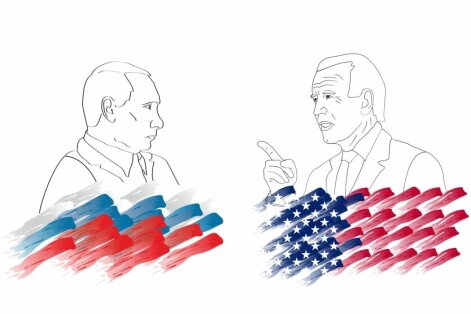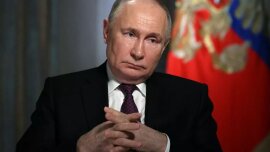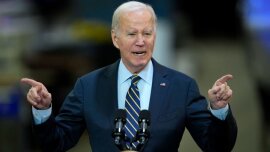So we have waited for this year's first American-Russian "security dialogues", which were formally launched by US President Joseph Biden last June. Since that time, the United States and Russia have held another online summit and several interim meetings at the level of ministers, deputy ministers and heads of departments within the framework of bilateral working commissions established at the end of the Geneva summit.
In November-December, against the backdrop of yet another crackdown on information about the military-political escalation around Ukraine and after the virtual Biden-Putin summit in December, another round of negotiations was announced, but now in a multilateral format. True, with a clear hierarchy: first, the Americans and Russians will talk, and then a meeting between the Russian Federation and the European allies of the United States will take place.
I recommend other materials on this topic:
- V. Zelensky's foreign policy deadlock: the international eco-system around Ukraine in 2021;
- Controlled Confrontation: Analysis of the Biden-Putin Summit;
- Biden sanctions against Russia: full analysis and summary;
- Virtual Putin-Biden summit: analysis of the main results;
- Putin's "ultimatum" and the Russian-Ukrainian war of 2022.
Despite the fact that expectations in this regard were rather low on the part of the participants themselves, the event became one of the key events for the world this year. In Ukraine, such meetings "at the very top" are always looked at, although not without a share of a certain political fetish and infantilism. Nevertheless, this time our topic was wrapped up in negotiations as one of the key ones, though not the only one.
The talks in Geneva lasted for 8 hours, with a lunch break. The Russian delegation was headed by two - Deputy Foreign Minister Sergei Ryabkov and Deputy Defense Minister Alexander Fomin. The Americans were represented by US Under Secretary of State Wendy Sherman. Fomin's presence was evidently meant to show that Russia was serious. And if the nuclear fears of the international community were formally closed by the recent declarative statement of the "nuclear five", then the threat of the military force use by Russia remains, which, in fact, worries everyone in the West. As the main deterrent argument, Washington and Brussels continue to use sanctions pressure and arms supplies to Ukraine - a traditional set of measures that have not changed since 2014, which the West is ready to use in case of further escalation.
As expected, the "Geneva Dialogues" did not end with a significant breakthrough in relations between the two countries. Mutual distrust remains central to the bilateral US-Russian agenda. The mental-cultural and ideological gap is huge, which can be seen even from the dry official statements of state structures. Neither S. Ryabkov nor W. Sherman began to raise the bar of expectations, although the Russian representative allowed himself a little optimism, calling the meeting "amazing", although "difficult".
Nevertheless, I can formulate some important conclusions, both about the future of the world and about Ukraine. I will try to integrate them into answers to basic questions that are now on everyone's lips and that are most often asked by journalists.
Why do the parties need these negotiations and why is Ukraine just a pretext?
The multipolar world has already become a reality. The era of Pax Americana is gradually fading away, and with it the rest of the structural elements of the old, post-bipolar liberal world order led by the United States. Countries perceive this process in different ways. Such as Russia, China, Turkey, UAE, Britain, Japan, Saudi Arabia, Iran, India and others willingly force this discourse, foreshadowing the imminent onset of a new world, which means the collapse of the "American world order", which was established after 1991. For new regional players who have long grown out of their "pants" of the Cold War period, the transition to a new system of international relations is a colossal opportunity to declare themselves, consolidate their functionality on the world stage, occupy the coveted niche in the world economy and implement plans in accordance with with their ideal vision of the future.
Most other countries that do not have significant resources, vision of the future, strong leaders, will, institutions and ambitions remain in the grip of the old world order, unable to fully comprehend the logic of intersystem transition. Usually, they continue to wallow in their internal micro-agenda, unable to overcome internal disagreements that prevent them from going beyond the usual superficial thinking. Ukraine also belongs to such countries.
Finally, in the United States and Western Europe, the breakup of the liberal world order was greeted with mixed feelings. On the one hand, the processes in the world economy and politics were inexorably approaching the end, and in some places in Western capitals this was understood. The West began to lose competition to Asian countries 10-15 years ago, and this process continues. On the other hand, the new era broke the old rules, which served mainly the interests of the countries of the collective West, led by the United States. And it was painful and difficult to accept this reality, especially against the backdrop of the absence of an alternative vision of the future.
The onset of a multipolar world pushed Russia towards a more aggressive and tough foreign policy. In the radical breakdown of the world order, which Moscow challenged back in the mid-2000s, the Kremlin sees for itself an opportunity to close the gestalt of the late 1980s and early 1990s, which remained one of the main sources of irritation in relations with the West, and at the same time a source of Russian resentment the last 25 years: revision of the results of the Cold War and the foundations of the European security architecture.
One of the reasons for the confident behavior of the Russian Federation in this direction is their support from a number of other countries that have claims similar to those in Russia to the established world order. It is curious that China and Turkey were sympathetic to the discourse on "security guarantees," which essentially launches a fundamental revision of the security architecture in Eurasia. Recep Tayyip Erdogan himself recently openly advocated a rethinking of the results of the Second World War and made claims to the “handful of victorious countries” for dictating the rules of the game to the rest of the world. Therefore, feeling solidarity with others, Russia is putting pressure on the West in order to quickly streamline the new rules of the game and bargain for a role that would better harmonize with the worldview of the Kremlin's political leadership. And for the rest, the victory of the Russian Federation would be their victory as well, since it would inspire such demarches. And no, this is not about a split into right and good democracies and bad and evil autocracies. This is precisely a dispute about the future and the past between various countries: between those who shared the main trophies of the Second World War and the Cold War, and those who feel left out and want more.
Proceeding from this, the American-Russian consultations are not about Ukraine, and not even about NATO with Europe, but about the establishment of new long-playing rules of the game for the next decades. The rules of a multipolar quasi-chaotic world overturning the usual post-war order, "renewed" after the Cold War in the form of a modern European security architecture, enshrined in the "Helsinki process" of the 1980s-1990s.
The situation around Ukraine is just an excuse to talk about it and only an element of mutual American-Russian claims. As much as we would like, but the "Geneva dialogues" touch on a whole range of issues, and the agenda between Moscow and Washington is truly global.
What are the fundamental differences in the approaches of the US and Russia in the negotiations?
The Russian political leadership based its approach on ressentiment, reproducing an opportunist, revolutionary-revanchist attitude towards the principles of European security and politics that were formed after the unification of Germany and the collapse of the USSR. First of all, it is the dominant role of Euro-Atlantic institutions, into which Russia was unable to integrate or find its other place as a partner equal in rights with the West.
The problem of NATO, which is discussed here as one of the flagship ones, is that from the point of view of the Russian leadership, the expansion of NATO and the EU into their former territories is nothing more than the continuation of building a hostile environment directed against the Russian Federation. Unlike the West, which position NATO as an exclusively defensive alliance of ideologically and value-close states, the Kremlin sees in it only an instrument of US influence in Europe. Therefore, the expansion of NATO - an organization that was created to counter Moscow - to the east is perceived as a military-political threat and a creeping militarization of the Russian periphery by Washington. The phrase thrown by S. Ryabkov after the talks in Geneva on the need for NATO to "stop developing the territories of the countries included in it after 1997" just reflects this perception of the situation.
For its part, the United States proceeds from the position of a weakening hegemon who realizes that his time is gradually passing, but he does not want to leave his post ahead of time, especially under pressure from outside and under the general hooting of those whom they consider worse than themselves. For the United States, the awareness of the world turning point is generally painful and depressing, even despite their falling into the internal agenda, which, in fact, became one of the main reasons for their inability to continue to pull on the world architecture and take responsibility for world processes.
W. Sherman's statements in Geneva show that the Americans consider the claims of the Russian Federation partly far-fetched and partly a bluff in order to bargain for superficial and tactical concessions. From their point of view, NATO's eastward expansion was justified because they won the Cold War. For them, the expansion of the Alliance at the expense of the countries of the former socialist camp is not an attack on the vital interests of Russia or a deception of the Russian leadership, but the triumph of their liberal-democratic capitalist model over communism, for which a just reward is due. And if this is a victory, then why should they make excuses or explain themselves to someone? And I must say that the Western countries have been doing this for a long time, and they did not particularly try to convince Russia of its perception. Giving legally formalized guarantees about the non-expansion of NATO would mean revising the entire policy of the Western bloc after 1997, which means recognizing it as wrong and erroneous, otherwise why was all this done?
In the comments of the American representatives, the emphasis was deliberately placed on tactical and technical aspects - the number of missiles that can be reduced, military exercises that can be limited, etc. It is more convenient for the United States not to attach too much importance to these consultations. Therefore, Washington is more willing to resolve certain secondary issues such as “How to force Ukraine to implement the Minsk agreements?” or “How to reduce the number of NATO military exercises in order to reduce tension with Russia?”. The US wants to package Russian claims for “security guarantees” with the broader and more vague issue of “strategic stability”, while making concessions only on some technical issues that do not affect fundamental aspects, such as legal guarantees of NATO non-expansion to the east or recognition for Russia's actual zone of influence in the post-Soviet space. This may create a precedent for other players, which is now unnecessary for the United States, for example, for the PRC in relation to Taiwan.
Unlike the United States, Russia wants to view these negotiations precisely as global and fundamental. Moscow believes that this is their chance to force the West, as S. Ryabkov put it, “to call things by their proper names,” and as the character of the famous play put it, “to speak directly, rudely, in an old man's way”. In this context, when you watch various kinds of press conferences or "direct lines" of V. Putin, it is not surprising that he does not even try to talk to Ukraine, Zelenskyy, Yermak, Macron or Merkel. He speaks to the United States, who are considered the real and only interlocutors on the other side of the table, capable of making real decisions.
For Russians, the current "security dialogues" are an attempt to carve out a new role for themselves in the security architecture, the role of a strategic partner in the field of security, an alternative center of power between the PRC and the West. For the Americans, "strategic security" is an attempt to tactically neutralize Russia, close this area with a temporary seal while preparations are underway for confrontation with China. The only question for them is what will be included in the material of this "seal" and what concessions, insignificant for the United States (I emphasize), can temporarily "shut up" Putin and his entourage.
How can the negotiations between the US and Russia end?
We must admit the obvious - the current round of negotiations is serious and long-lasting. No matter what anyone says, Putin is not bluffing just for the sake of his image. The stakes have been raised high enough, and Russia is demonstrating that it is ready to use force if the United States is unwilling to talk to them or if Russian claims are not taken seriously. Everything is moving towards a certain point of no return. In other words, Russia cannot back up and forget what happened over the past six months.
First, the international environment is too favorable. According to the logic of V. Putin's entourage, they may not have another chance. In Europe, political leaders are now changing, the main heavyweights who have supported the EU policy for the past 30 years are retiring. Angela Merkel completed her 16-year tenure as chancellor in December 2021. Sebastian Kurz was shot down by a corruption scandal that erupted in November. In Spain and Italy, the political situation is too unstable. Emmanuel Macron has a presidential election on his nose, which he could lose to his right-wing opponents. Britain set sail on its own with Boris Johnson, whose position on Downing Street is also increasingly being questioned. And the rise in popularity of various populists and right-wing conservatives, even if they do not advocate rapprochement with the Russian Federation, drives a wedge into intra-European relations, a striking example of which is the conflict between Brussels and the ruling parties in Poland and Hungary.
Meanwhile, Russia is doing well, having managed to intervene in several regional crises, from Syria to Kazakhstan, and has now received additional cards to trade with the United States. The energy situation gives the Russian Federation an opportunity to play on the gas market. What happened to gas and Kazakhstan to some extent created in Moscow a sense of self-confidence and superiority over other players, which also determines the rhetoric that Russian representatives, headed by S. Ryabkov, allow themselves.
Finally, the situation in Ukraine is not getting any better. The war declared by V. Zelenskyy to several financial and oligarchic groups runs the risk of unbalancing the political system, which is already on the verge of an artificial coma, into which the president and his team tried to introduce it in their revolutionary reformist impulse, going beyond the legal framework, but not knowing how to get back. The rise in gas prices and the collapse of the heating season 2021-2022 have called for an terrifying shadow of tariff increases for the population and has already led to a rise in food prices and the closure of some enterprises. The collapse of Zelenskyy's ratings to his core ones has transferred the regime of the new government to a chronic borderline state, when various initiatives have to be pushed through with battles and against the background of distrust / indifference of a significant part of the population. According to the logic of the Russian leadership, this is the ideal time to try to push through their "Wishlist" in a conversation with the West, which itself, to put it mildly, is tired of the Ukrainian issue.
Secondly, too much political and reputational capital has been invested. V. Putin's press conference in December 2021 is not just words, it was organized in order to raise the stakes and lead the situation into a corner from which there is no turning back. In fact, Putin burned several bridges with his pre-Christmas statements, showing his intention to go to some logical end. If he turns back or hides this story without any action, then in the perception of the internal audience and part of the external elites, this will be a major image and political defeat, after which the threats of the Russian Federation will be perceived even less seriously. It seems to me that the Kremlin cannot allow this to happen.
The Americans are also interested in some outcome of the negotiations. For the Biden administration, negotiations with the Russian Federation are an important diplomatic maneuver, which by the midterm elections to Congress in November 2022 should end with something, preferably some kind of victory, even if it is petty and insignificant for the interests of the United States. The victory of the Republicans in the congressional elections will lead to the paralysis of Biden's policies, which means they will make negotiations with the Russian Federation even more difficult.
In short, what should be expected from the US-Russian talks is not so much concrete answers to all issues on the agenda as measurements of the readiness of the parties to make concessions and the principles on the basis of which they will be ready to talk about it. In other words, these negotiations will show us what the threshold for mutual acceptance of each other's interests will be, and in what forms the parties will accept them. And most importantly, whether Ukraine will be packed there.
Mutual compromise with concessions for the sake of a common goal is an idealistic option that is hardly possible between the Russian Federation and the United States at this stage. Too big a cultural and mental gap between the leaderships of the two countries.
A more likely option would be the orderly confrontation that Biden talked about last year. It presupposes the achievement of some kind of mutual understanding based on the "red lines" and "sanitary borders" tacitly recognized by the parties. At the same time, the depth of concessions can be small and extended over time. Orderliness is what the Americans will focus on, for whom the Russian direction should become predictable and moderately dangerous, while they turn to China and try to solve internal problems.
The worst option is to preserve the status quo with the subsequent cementing of the actual, but not recognized, zones of influence and the uncontrolled fragmentation of the international architecture into flexible, situational blocks of interests. Having not received what it wants, Russia will try to create its ideal world on its own on its periphery, where it feels confident and capable of imposing its will - the post-Soviet space, the South Caucasus, the Levant, and Central Asia. At the same time, the West will be forced either to react, being drawn into unpredictable crises with an indefinite end, allocating more and more resources to those areas from which they want to move away, or not to react (as in the case of Kazakhstan), losing its reputation and creating the impression of permissiveness and chaos international relations. This is a bad outcome, since it is the most unstable and dangerous, suggesting a return to the noble confrontation of the 19th and early 20th centuries, but with much less clear and accepted rules of the game.
How will this affect Ukraine?
Our problem in the context of the Geneva talks has long been known. This is institutional weakness and inability to formulate our own agenda. In such a situation, we will be in the pool of those countries that will fall under the complete dependence of external factors and big players, gradually losing the will to make independent decisions, freedom of thought and information, and the ability to choose their own path of development.
Unfortunately, such states become frontiers in great-power rivalry, a "gray zone" or buffer territory where major players sort things out. Such a path is fraught with dooming our territory to long-term poverty and instability, in an atmosphere in which it is impossible to develop a complex economy.
Therefore, the Russian-American "security dialogues" are of decisive importance to us. However, Ukraine should not just sit and wait for the outcome of the negotiations, accepting any outcome that we are deigned to communicate from Washington. We need to formulate several important theses for ourselves and an external audience that will allow us to free ourselves from the mental and conceptual limitations of the last 7 (30) years:
- Ukraine will fight to the end if the outcome of the negotiations calls into question our sovereignty and independence. Regardless of the results, we must convey to the external audience that we will fight, even with weapons in our hands. This presupposes already now the adoption of a number of measures that should show the determination of the country's leadership to defend itself: the formation of a territorial defense system, the speedy transfer of the army to a contract, the purchase of weapons and the production of our own air defense, missiles, ammunition, equipment, the restoration of the fleet, information training of the population, etc.;
- Ukraine recognizes the "death" of the old world order and the onset of a multipolar world. This frees us from the limitations of the old concepts of national security and foreign policy, which were based on three beliefs: in a united Western anti-Russian front (which no longer exists), in the magical power of other people's sanctions (which is overestimated) and in the early accession to NATO as the main guarantee of security against RF (which will not happen). This will help start the process of preparing a qualitatively new foreign policy and the concept of national security and defense, which should be based on pragmatism, freedom and readiness for integrated participation in the global agenda;
- Ukraine has its own interests and a specific position regarding the Donbas and Russia, which should be taken into account. Without a clear articulation of our interests (providing for the rejection of the policy of zigzagging), we will not be taken seriously, and our interests will not be considered in the way we want them to be.

























